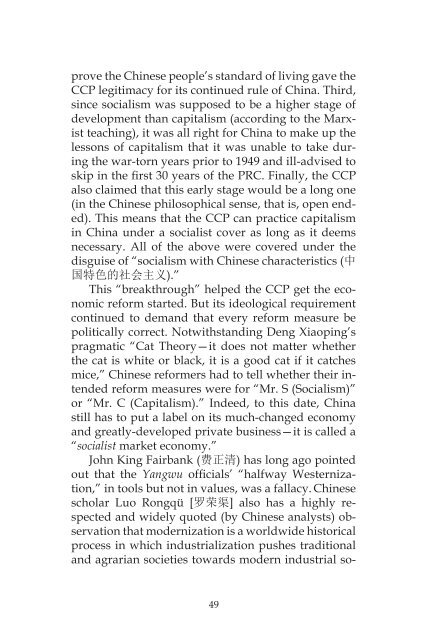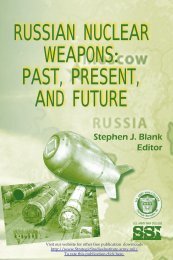- Page 1 and 2:
U.S. ARMY WAR COLLEGE STRATEGIC STU
- Page 3 and 4:
***** Comments pertaining to this r
- Page 5 and 6:
Appendix 1: Selected Articles From
- Page 7 and 8:
with the United States? How does th
- Page 10 and 11:
SUMMARY This analysis discusses the
- Page 12 and 13:
and unexpected challenges. U.S. and
- Page 14 and 15:
ahead, while the United States shou
- Page 16 and 17: provocative acts, adamantly opposes
- Page 18 and 19: CHAPTER 1 INTRODUCTION We can’t p
- Page 20: Finally, the next 30 years will be
- Page 23 and 24: Figure 2-1. Structure of Internatio
- Page 25 and 26: As a general rule, mature nations m
- Page 27 and 28: centuries, periodic internal breaku
- Page 29 and 30: However, British power gradually de
- Page 31 and 32: aftermath of World War I. President
- Page 33 and 34: In retrospect, we can make the argu
- Page 35 and 36: malized” Japan (presumably so wit
- Page 37 and 38: and China. For centuries, China as
- Page 39 and 40: expansion. Russia is not happy with
- Page 41 and 42: dissatisfied second-ranked power. I
- Page 43 and 44: danger of war because the condition
- Page 45 and 46: 21. See a recent analysis of Russia
- Page 47 and 48: In the face of these daunting chall
- Page 49 and 50: West. This sentiment runs deep and
- Page 51 and 52: the changes to China appear nonthre
- Page 53 and 54: Unfortunately, the emperor and the
- Page 55 and 56: the Qing started to rock the dynast
- Page 57 and 58: In October 1928, the ROC government
- Page 59 and 60: were confident and eager to unleash
- Page 61 and 62: those so-called “leaders of capit
- Page 63 and 64: Figure 3-3. Top Iron/Steel Producti
- Page 65: system modernization (although the
- Page 69 and 70: Just as the world was experiencing
- Page 71 and 72: The Coming Conflict with China was
- Page 73 and 74: from the Chinese point of view, the
- Page 75 and 76: States in particular (the Chinese E
- Page 77 and 78: now willingly to become a member of
- Page 79 and 80: coincidence of interests is a matte
- Page 81 and 82: Chinese way of thinking to encourag
- Page 83 and 84: 18. Warlords such as Feng Guozhang
- Page 85 and 86: 31. See, for example, the United Na
- Page 87 and 88: Mearsheimer’s Presentation at Sha
- Page 89 and 90: 58. Chinese Premier Wen Jiabao deli
- Page 92 and 93: CHAPTER 4 THE FUTURE OF U.S.-CHINA
- Page 94 and 95: the significance of their ambitions
- Page 96 and 97: ical, economic, security, and cultu
- Page 98 and 99: POSSIBLE OUTCOMES FOR THE U.S.-CHIN
- Page 100 and 101: on important issues of the day. Nev
- Page 102 and 103: A Change of Guard? The peaceful cha
- Page 104 and 105: The U.S. push for democratic change
- Page 106 and 107: opposed Soviet hegemony over the co
- Page 108 and 109: However, the harmonious world const
- Page 110 and 111: cover for the Chinese leaders to pr
- Page 112 and 113: sonable demands. The CCP, after all
- Page 114 and 115: United States stands for the democr
- Page 116 and 117:
to overstep on each other’s inter
- Page 118 and 119:
stated in the treaty “with satisf
- Page 120 and 121:
of war reparation to Japan followin
- Page 122 and 123:
cultural, and historical interests.
- Page 124 and 125:
version to conquer independent nati
- Page 126 and 127:
• The U.S. side declared: The Uni
- Page 128 and 129:
malization of relations with the Un
- Page 130 and 131:
the “One-China” principle, whic
- Page 132 and 133:
ment. The KMT’s landslide victori
- Page 134 and 135:
ing. As China becomes more powerful
- Page 136 and 137:
This combination of [PLA] rapidly a
- Page 138 and 139:
U.S. aircraft carrier group making
- Page 140 and 141:
earlier, it has been conducting thi
- Page 142 and 143:
the planned war games, many took th
- Page 144 and 145:
field Bank (中沙群岛) in the mi
- Page 146 and 147:
to accept the territorial “spoils
- Page 148 and 149:
littoral nations to claim the 200 n
- Page 150 and 151:
neighbors, especially the Southeast
- Page 152 and 153:
sertive measures to settle the disp
- Page 154 and 155:
Philippines’ claimed South China
- Page 156 and 157:
Asian Affairs at the National Secur
- Page 158 and 159:
audience (there were 27 of them at
- Page 160 and 161:
15th anniversary of the U.S.-Vietna
- Page 162 and 163:
compromised by recommending claiman
- Page 164 and 165:
Indeed, the current fight over thes
- Page 166 and 167:
and the handover of those islands t
- Page 168 and 169:
for ruling on maritime disputes: on
- Page 170 and 171:
Han Chinese, the ones in Tibet and
- Page 172 and 173:
Development takes time. Between now
- Page 174 and 175:
• During the Qing Dynasty, the ce
- Page 176 and 177:
was erected at the Tibet-China bord
- Page 178 and 179:
• In October 1950, the newly-foun
- Page 180 and 181:
Deputy Director of the CCP’s Cent
- Page 182 and 183:
a statutory position of Special Coo
- Page 184 and 185:
equivocally that he does not seek s
- Page 186 and 187:
the Chinese, Mongols, and the Turki
- Page 188 and 189:
大会 or 世维会). It is an inte
- Page 190 and 191:
U.S.-CHINA POWER TRANSITION: AT ODD
- Page 192 and 193:
way China develops, and guard again
- Page 194 and 195:
• In March 2010, the U.S. State D
- Page 196 and 197:
Specifically, they pressed the Chin
- Page 198 and 199:
on China on democratic change, dead
- Page 200 and 201:
Will China follow the example of U.
- Page 202 and 203:
China power transition were to end
- Page 204 and 205:
the arms sales business. For all th
- Page 206 and 207:
no substitute for the efforts to wi
- Page 208 and 209:
With an adjustment in its national
- Page 210 and 211:
In addition to these quantitative c
- Page 212 and 213:
other items to China that still rem
- Page 214 and 215:
ment and containment, with ample ev
- Page 216 and 217:
un, this kind of relationship is no
- Page 218 and 219:
U.S.-China power transition is a lo
- Page 220 and 221:
a preventive war launched by the do
- Page 222 and 223:
look Database, April 2010). The Wor
- Page 224 and 225:
ary 2006, for a discussion of China
- Page 226 and 227:
Chinese critiques of the harmonious
- Page 228 and 229:
Rule by Virtue”), 刊授党校,
- Page 230 and 231:
year term in prison for what he sai
- Page 232 and 233:
66. Dwight D. Eisenhower, The White
- Page 234 and 235:
80. See PRC position on this issue
- Page 236 and 237:
Xinhua News Agency, March 11, 2009;
- Page 238 and 239:
The delegates rejected the Soviet a
- Page 240 and 241:
York: Metheun, 1982; Li Jinming (
- Page 242 and 243:
the Mischief Reef and Deploying Fig
- Page 244 and 245:
“Hearing on Maritime Territorial
- Page 246 and 247:
the Persian Gulf region will be reg
- Page 248 and 249:
our alliance responsibilities,” q
- Page 250 and 251:
169. See also Wangchuk Deden Shakab
- Page 252 and 253:
Gyaltsen Gyari, “The Way Forward
- Page 254 and 255:
190. The Central Tibetan Administra
- Page 256 and 257:
203. The highest-ranking Chinese of
- Page 258 and 259:
213. Henry Kissinger, On China, New
- Page 260 and 261:
232. See Shirley Kan, “U.S.-China
- Page 262 and 263:
APPENDIX 1 SELECTED ARTICLES FROM T
- Page 264 and 265:
other activities for the economic e
- Page 266 and 267:
The continental margin comprises th
- Page 268 and 269:
Article 77: Rights of the Coastal S
- Page 270 and 271:
Article 81: Drilling on the Contine
- Page 272 and 273:
State, or in the archipelagic water
- Page 274 and 275:
APPENDIX 2 CAIRO DECLARATION 1 Conf
- Page 276 and 277:
APPENDIX 3 POTSDAM PROCLAMATION 1 D
- Page 278:
Japan shall be permitted to maintai
- Page 281 and 282:
Article 3: Japan will concur in any
- Page 283 and 284:
U.S. ARMY WAR COLLEGE Major General

















